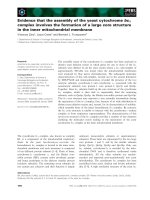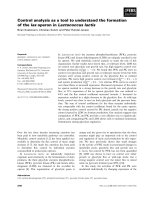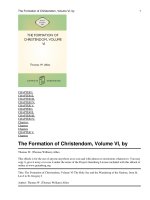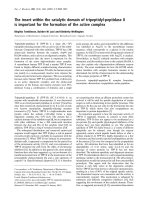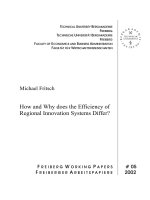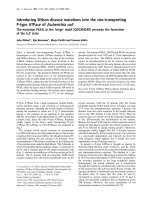How does the institutional environment affect the formation of political connections
Bạn đang xem bản rút gọn của tài liệu. Xem và tải ngay bản đầy đủ của tài liệu tại đây (203.89 KB, 57 trang )
HOW DOES INSTITUTIONAL ENVIRONMENT AFFECT THE
FORMATION OF FIRMS’ VARIOUS POLITICAL CONNECTIONS?
YANG BENXIN
A THESIS SUBMITTED
FOR THE DEGREE OF MASTER OF SCIENCE IN BUSINESS
DEPARTMENT OF BUSINESS POLICY
NATIONAL UNIVERSITY OF SINGAPORE
2008
ACKNOWLEGEMENT
This thesis would not be possible without the help and support from many of my
tutors, friends, and colleagues. I greatly thank my supervisor, Associate
Professor Ishtiaq Pasha Mahmood. Some of the ideas presented in this thesis are
originated from my numerous discussions with him. He has the amazing ability
to approach an interesting research question. His piercing insights, disciplined
analysis, and passion inspire me to think critically and help me to improve the
thesis in many aspects. I thank Miss Hong-jin Zhu and Dr Qiang Fu for the
contributions that they have made to my research, as well as to the improvement
of this thesis.
I am grateful to senior students in NUS: Hong-jin Zhu, Zhong-hua Wu, Wei-wei
Xu, Yi Yuan, Jian-feng Shen, and Wen He among many others. They are
encouraging and considerate. I value the friendship that I have made with fellow
students in NUS: Xue-juan Zhao, Zhi-ying Jiang, Qing-xia Kong, Xu-hui Jin,
Navid Asgari, and Sairah Hussain among many others. They are the sparkles in
my life. I thank them to be important sources of my encouragement. They have
been my tutors at different points along the way.
i
Needless to say, I am solely responsible for any errors or imperfections that may
remain in the thesis.
Yang Benxin
Dec, 19th, 2008
ii
TABLE OF CONTENTS
ACKNOWLEGEMENT........................................................................................ I
TABLE OF CONTENTS.................................................................................... III
SUMMARY ...........................................................................................................V
LIST OF TABLES..............................................................................................VII
INTRODUCTION..................................................................................................1
LITERATURE REVIEW AND THEORY ..........................................................5
1. PROPERTY RIGHTS INSTITUTIONS
AND CONTRACTING INSTITUTIONS ..................................................................5
2. INSTITUTIONAL STATUS QUO
AND CREDIBILITY ............................................................................................7
3. FORMAL POLITICAL CONNECTION
AND INFORMAL POLITICAL CONNECTION.....................................................10
4. PROPERTY RIGHT INSTITUTIONS
AND FORMAL POLITICAL CONNECTION ........................................................12
5. CONTRACTING INSTITUTIONS
AND INFORMAL POLITICAL CONNECTION.....................................................13
6. MODERATION EFFECT OF POTENTIAL POLITICAL RECOURSES
ON THE FORMATION OF POLITICAL CONNECTIONS ......................................14
EMPIRICAL SETTING......................................................................................17
1. INSTITUTIONAL ENVIRONMENT
AND POLITICAL CONNECTIONS IN CHINA ......................................................17
2. ENDOGENOUS CONCERN OF POLITICAL CONNECTIONS ...............................20
DATA AND MEASURES ....................................................................................23
1. DATA SOURCE AND SAMPLE ............................................................................23
2. MEASURE........................................................................................................24
2.1 Dependent Variables .................................................................................24
2.2 Independent Variables...............................................................................25
2.3 Control Variables ......................................................................................26
EMPIRICAL ANALYSES...................................................................................29
1. SUMMARY STATISTICS ....................................................................................29
iii
2. ALTERNATIVE EXPLANATION.........................................................................35
3. REGRESSION RESULTS ....................................................................................36
DISCUSSION .......................................................................................................42
CONCLUSION ....................................................................................................45
BILIOGRAPHY:..................................................................................................47
iv
SUMMARY
While prior research has suggested that connections between business leaders
and political actors are a primary determinant of firm strategy and performance,
relatively little attention has been directed to how those political connections are
determined by various institutional environments. Drawing on institutional
theory and the perspective of social network, I argue that the weak institutional
environment fosters the political connections. Specifically, as a complement to
previous research that has clustered institutions, I unbundle institutions into
property rights institutions and contracting institutions and specify how the
status quo and the credibility of different institutions differentially affect the
process of tie formation. Moreover, I investigate whether the effects of
institutions may vary across different types of political connections. Lastly, I
consider the moderation effect of entrepreneurs’ political capital on the
relationship between institutional environment and tie formation.
Based on a sample of 736 firm-year observations of Chinese private listed firms
between 2002 and 2005, I found that: First, the better the status quo of
institutional environment, the less likely the formation of political connections is.
v
Second, firms are likely to establish formal political connections when property
rights institutions are not credible, whereas they tend to engage in cultivating
informal political connections when contracting institutions are not credible.
Third, entrepreneurs’ individual political capital negatively moderates the
relationship between institutional environment and tie formation.
vi
LIST OF TABLES
TABLE 1. SUMMARY STATISTICS ...........................................................................30
TABLE 2. CORRELATION MATRIX .........................................................................31
TABLE 3. DESCRIPTION OF THE SAMPLE OF
POLITICAL CONNECTED FIRMS BY PROVINCE .....................................32
TABLE 4. DESCRIPTION OF THE SAMPLE OF
POLITICAL CONNECTED FIRMS BY INDUSTRY......................................33
TABLE 5. DESCRIPTION OF THE SAMPLE OF
POLITICAL CONNECTED FIRMS BY YEAR .............................................34
TABLE 6. DESCRIPTION OF THE SAMPLE OF
POLITICAL CONNECTED FIRMS BY INSTITUTIONS................................34
TABLE 7. PROPERTY RIGHTS INSTITUTIONS
AND POLITICAL CONNECTIONS .............................................................38
TABLE 8. CONTRACTING INSTITUTIONS
AND POLITICAL CONNECTIONS .............................................................39
TABLE 9. FULL MODEL OF THE RELATIONSHIP
BETWEEN INSTITUTIONS AND POLITICAL TIES .....................................44
vii
Introduction
Scholars have gradually recognized the importance of political connections
between business people and political actors to firm performance in both
developed economies and emerging economies (i.e. Fisman, 2001; Faccio, 2006).
However, few papers studied the origination of political connections. Besides the
micro determinants of political connections such as ownership types of firms (Xin
and Pearce, 1996) and managers’ political capital based on family, hometown
connections, alumni, and even colleagues (Peng and Luo, 2000; Li and Zhang,
2007), previous research suggested seemingly controversial findings of the effect
of macro institutional environment on the emergence of political connections.
Some studies suggest that political connections tend to proliferate in weak
institutional environment because they serve as substitutes of the underdeveloped
institutional support (i.e. Nee, 1992; Boisot and Child, 1996), while others imply
that political connections, circumscribed by the strong institutional environment,
are also very prevalent in developed economies due to the substantial resources
and information they are able to leverage (Geletkanycz and Hambrick, 1997;
Bertrand, et al., 2004). An interesting question for strategy research remains
under-examined: How does institutional environment affect the formation of
firms’ various political connections?
In light of the institutional theory and social network perspective, I argue that how
1
institutional environment shapes firms’ political networking may be explained if
the broad cluster of institutions is unbundled based on their distinct nature.
Following Acemoglu and Johnson’s argument (2005), I view institutions as
heterogeneous in the sense that two sets of institutions are pertinent to the survival
and growth of firms: property rights institutions and contracting institutions
(Williamson, 1975, 1985; De Long and Shleifer, 1993; Olson, 2000). The former
institutions protect firms from expropriation by the government and the latter
enable arm’s length transactions between firms (Acemoglu and Johnson, 2005).
Moreover, I specify the status quo of institutional environment and the credibility
of such environment. The status quo of institutional environment refers to whether
the institutions are efficient to regulate property rights and the transaction between
citizens (i.e. Brunetti and Weder, 1994; Borner, et al, 1994). And the credibility of
institutions refers to whether institutional safeguards are provided to prevent
arbitrary changes in institutions (Brunetti and Weder, 1994). Realizing that
institutions are changing, I argue that firms may decide whether to cultivate
political connections based on the status quo and the credibility of property rights
institutions and contracting institutions.
Specifically, I consider two types of political connections that are most prevalent
and important among private firms and the state: formal political connections that
arise when founders of private firms serve as members of the Congress or
Parliament (Faccio, 2006) and informal political connections that are based on
face-to-face interactions between corporate leaders and political actors (Chung,
2
Mahmood, and Mitchell, 2007). I argue that firms are likely to establish formal
political connections when the status quo of property rights institutions is weak
and the credibility of property rights institutions is low, whereas they tend to
engage in cultivating informal political connections when the status quo of
contracting institutions is weak and the credibility of contracting institutions is
low. I further argue that these relations are negatively moderated by micro-level
determinants, such as entrepreneurs’ political capital.
I propose a contingency model to specify my argument of the emergence of
political connections. I test this model in the setting of private listed firms in
China from 2002 to 2005. The prevalence of political connections maintained by
private listed firms as well as the diversity in institutional environment across 31
provinces makes Chinese private listed firms an attractive setting to examine the
theoretical arguments. My empirical analysis is conducted using an extensive
longitudinal dataset including 736 firm-year observations in total. The results are
largely consistent with my hypotheses: The effects of the status quo and the
credibility of institutions on the formation of political connections are contingent
on the types of institutions as well as the types of political connections pursued.
My study makes five key contributions to the literature. First, I contribute to
network research by investigating the institutional origin of network ties between
business arena and political arena, which has been under-studied in extant
research. Second, by explicitly distinguishing two sets of institutions in which
3
firms are embedded in, I also enrich institutional theory by highlighting the
heterogeneity of institutions in their nature and exhibiting their influence on
organizational actions. Third, not only do I identify the effect of the status quo of
institutions on firm’s behaviors, but my findings also first empirically support the
importance of institutional credibility, an aspect of research on institutions that has
received little notice in the literature. Fourthly, I conduct a cross-level analysis to
indentify the moderation effect of micro-level determinants on institutional origin
of network ties. Fifthly, my study also improves our understanding of the political
strategy of Chinese private firms, which are a vital and fast growing component of
China’s transition economy.
4
Literature Review and Theory
1. Property Rights Institutions and Contracting Institutions
Acemoglu and Johnson (2005) summarized the growing consensus among
economists and political scientists that “the broad outlines of North’s story are
correct: the social, economic, legal, and political organization of a society, i.e., its
‘institutions,’ is a primary determinant of economic performance”. They view
institutions heterogeneous in their nature and classified the cluster of institutions
into two categories: On the one hand, following the contract theory literature,
starting with Coase (1937, 1960) and Williamson (1975, 1985), Acemoglu and
Johnson (2005) argued that the legal framework that enables contracts between
organizations (i.e. contracting institutions) is provided by the state and associated
institutions to facilitate economic transactions. On the other hand, Acemoglu and
Johnson (2005) condensed the ideas from Jones (1981), De Long and Shleifer
(1993), and Olson (2000), and argued that the state and associated institutions also
enact laws and regulations to protect individuals and firms against expropriation
by the government and powerful elites (i.e. property right institutions).
Highly supportive empirical result found by Acemoglu and Johnson (2005)
confirms the distinction between contracting and property rights institutions:
“They think of contracting institutions as mainly affecting the costs of enforcing
5
private contracts…Contracting institutions affect private transactions and create
ex post transfers between parties… For example, when it is more difficult for
lenders to collect their loans, interest rates increase, or banks that can monitor
effectively will play a more important role, or reputation-based credit
relationships will develop.”
“On the other hand, property rights institutions determine the interaction between
individuals and the government (and the political elites who control the
government)…. Property rights institutions, which determine the degree to which
the government, politicians, and elites are constrained in their relationships with
the rest of the society…When property rights institutions do not constrain elites,
these elites are more likely to violate the property rights of individual producers
and expropriate their incomes or assets. When it comes to arrangements
regulating property rights and the relationship between the state and individuals,
i.e., property rights institutions, the option to engage in ex ante contracts to avoid
ex post distortions is not available. Individuals cannot write contracts with the
state to constrain future actions by the state and elites controlling the state…It is
impossible to write credible contracts with the state to prevent future
expropriation, since the state, with its monopoly of legitimate violence, is the
ultimate arbiter of contracts (see Acemoglu 2003).”
Acemoglu and Johnson (2005) also concluded that property rights institutions
have a more important effect on economic outcomes than do contracting
6
institutions. Accordingly, property right institutions are fundamental to the
survival and development of private firms. Without secure property rights, private
firms are less likely to invest and grow. It is found that secure property rights are
both necessary and sufficient to induce investment by entrepreneurs (i.e. Johnson,
McMillan, and Woodruff, 2002). Thus, firms pursue long-lasting and reliable
political protection of property right institutions. In contrast, contracting
institutions regulate the transaction between private parties. They are concerned
about issues such as resolving disputes and competing for resources. Quick
response and problem-solving approaches are expected by the firms when they
face troubles in contracting institutions.
To get a fine-grained understanding about how firms are motivated to establish
ties with local authorities in specific institutional environment, it is necessary to
unbundle institutions based on their distinct nature and specify how firms mitigate
specific institutional risk by taking advantage of political connections. Thus, in
light of Acemoglu and Johnson’s argument (2005), I will investigate the distinct
influences on organizations of property right institutions and contracting
institutions in this paper.
2. Institutional Status quo and Credibility
Prior studies have shown that strong institutional environments may promote the
formation of political connections. It is found that political networks in developed
7
economies such as United States create conduits for timely market information,
and abundant factor resources, which are likely to exert paramount influence on
firm performance (Geletkanycz and Hambrick, 1997). However, weak
institutional environments are more often seen as facilitating the proliferation of
political connections (i.e. Nee, 1992; Boisot and Child, 1996). Due to the
insufficient institutional support, such as reliable government and well-established
legal system, firms cultivate political connections to manage uncertain
environment and to satisfy their resource needs (Xin and Pearce, 1996). For
example, Nee (1992) considered the close ties between private firms and local
government in China, which are maintained by paying “management fee” for
assistance in obtaining reliable access to factor resources and political protection.
Two dimensions of the overall institutional goodness or perfectness are considered.
Firstly, a number of prior studies have focused on how the status quo of the
institutional environment may influence the emergence of political connections.
Scholars examined how well the institutions are to regulate property rights and the
transaction between citizens (i.e. Brunetti and Weder, 1994; Borner, et al, 1994),
namely, are there enough institutions to regulate property rights and the
transaction between citizens. For example, as Borner, Brunetti and Weder (1995)
presented in their Nicaragua case: “Refining property rights in the narrow sense is
merely a question of accounting: you must know how large a property is, who the
owner is, and you must register this information…property-rights problems were
more or less resolved in Nicaragua in 1993 (p50)”. Thereby, in this paper, I define
8
status quo of institutional environment as the amount of institutions which
regulate the relationship between the state and the citizens, as well as the
relationship among citizens in a region.
Secondly, scholars also resorted to the credibility or reliability of institutions,
which are characterized by “rules that are not enforced in an arbitrary fashion and
a process of rule-making that is transparent and predictable” (Borner, et al, 1994
Brunetti, et al, 1998). For example, Borner, Brunetti and Weder (1995) presented:
“Although, according to this narrow view, property-rights problems were more or
less resolved in Nicaragua in 1993, the climate of constant threat to property has
still had a devastating effect on the expectations of private investors. There is
simply no confidence in the sanctity of private property and in the enforcement of
property laws. We even argue that this uncertainty has spread to a general
mistrust of the reliability of enforcement of all laws and regulation (p51)”.
Furthermore, scholars provided detailed cases to support the importance of this
institutional dimension in Thailand, Philippine and many other less developed
countries (Brunetti and Weder, 1994; Borner, et al, 1994; Borner, et al, 1995).
Compared with the situation with no institution, the context with a few institutions,
where executives or the political elites still are endowed with large discretionary
power, is better for entrepreneurs. Thus, to some extent, the status quo of
institutions refers to the part of discretionary power that has been restrained.
Better status quo of institutions associates with higher level of institutional
9
perfection. In contract, the credibility of institutions refers to the part of
discretionary power that has not been restrained. For example, in Nicaragua case
presented by Borner, et al, (1994), the institutional environment is not credible
when entrepreneurs feel the property rights institutions are not reliable (i.e. a
powerful politician could change laws at anytime. (p154)). For another example,
in Indonesia case also presented by Borner, et al, (1994), the institutional
environment is not credible when entrepreneurs feel the contracting institutions
are not reliable (i.e. “the judge has enough discretionary power. The party who
pays more will win the court case.”(p5)). Therefore, lower level of credibility of
institutions associates lower level of institutional perfection.
Considering the fact that firms are likely to take actions, like cultivating political
connections, based on their perceived institution (Duncan, 1972), I examine the
effects of the status quo of institutions and the credibility of institutions on the
likelihood of firms to form political connections. Specifically, I investigate the
status quo of institutions and the credibility of two types of institutions that are
crucial to the survival and development of firms: property right institutions and
contracting institutions.
3. Formal Political Connection and Informal Political Connection
I define political connections as individually-based linkages between business
leaders and political actors such as party leaders, government officials, and elected
10
legislators (Taira and Wada, 1987; Zeitlin and Ratcliff, 1988). Specifically, I
consider two approaches adopted by business leader to connect with the political
arena (Chung, Mahmood, and Mitchell, 2007): Firms may get formally connected
with politicians when their leaders occupy two distinct positions, one in business
arena and the other in political arena. Firms may also establish informal political
connections through face-to-face interactions between corporate leaders and
political actors.
The formal position interlocks provide firms with reliable conduits to pursue
political protection because the corporate executive and the politician are the same
person. Entrepreneur’s membership of the Congress or Parliament is one of the
prevalent types of formal political connection (Faccio, 2006). However, the
establishment of such political connections is time consuming with persistent
investment of resources. Moreover, formal political connections usually face
stringent public scrutiny from the media and other observers, thereby cannot
facilitate firms unrestrictedly.
In contrast, informal political connections are less reliable than formal ones in
seeking long-lasting political protection because they highly depend on particular
government officials. The change of regimes could quickly diminish the value of
such political connections (Siegel, 2007). However, “grease money” and
“protection money” always facilitate the quick constitution of informal political
connections that are based on face-to-face interactions between corporate leaders
11
and political actors (Cai, Fang and Xu, 2007). Further, informal political
connections are more inconspicuous than formal ones, and thus bear less
opportunity costs resulting from the possible disclosure of malfeasance.
Therefore, to maximize the benefit and minimize the cost of their political
investments, firms could choose appropriate forms of political connections based
on the specific institutional environment they face.
4. Property Right Institutions and Formal Political Connection
As referred, property rights institutions are fundamental to the survival and
development of private firms. Borner, et al. (1994) alleged that creditable property
rights are “the most important precondition for development based on
private-sector activity”. The secure property rights are both necessary and
sufficient to induce investment by entrepreneurs (Johnson, McMillan, and
Woodruff, 2002). Compared to formal political connections, though informal
political connections are more flexible and efficient in problem solving and cost
less, they cannot guarantee the long-lasting security of a firm because of the weak
accountability of informal political connections (Chung, Mahmood, and Mitchell,
2007). Thereby, when property rights institutions are weak, especially when the
credibility of property rights institutions is low, firms pursue long-lasting and
reliable political protection, which does not change with the alteration of
legislators and government officials. Entrepreneur’s formal political connections,
12
like the membership of the Congress or Parliament are very appropriate to provide
firms with reliable conduits to impel the legislation, by which firms obtain the
sustaining protection by a strong legal effectiveness of laws.
In line with this argument, I propose the following hypotheses:
Hypothesis 1a (Property rights institutions and formal political connections): The
probability of a formal political connection decreases with the level of perfection
of property rights institutions.
Hypothesis 1b (Property rights institutions and formal political connections): The
probability of a formal political connection decreases with the level of credibility
of property rights institutions.
5. Contracting Institutions and Informal Political Connection
Contracting institutions regulate transactions between private firms and other
private parties. It concerns issues such as resolving disputes and competing for
resources. Compared to informal political connections, formal political
connections are more reliable and are able to provide sustaining protection, but
they cost more and have response lag. When contracting institutions are weak,
especially when the credibility of contracting institutions is low, firms prefer
direct transactional facilitation approaches which can induce quick response and
solve case-by-case problems in business transactions. A negotiation between
13
private firms and local authorities, facilitated by an informal political connection,
appears to introduce flexibility into resolving problems with business transactions
and to allow for the reconstitution of transactions to respond to new opportunities
and changing circumstances. For example, Pye (1995) indicated that many
business transactions in China are settled through negotiation between
entrepreneurs and connected local government officials. Risks in transitions can
be managed informally in the political networks on the basis of reciprocity rather
than by reliance on formal laws of contract (Boisot and Child, 1996).
Hence, I propose the following hypotheses:
Hypothesis 2a (Contracting institutions and informal political connections): The
probability of an informal political connection decreases with the level of
perfection of contracting institutions.
Hypothesis 2b (Contracting institutions and informal political connections): The
probability of an informal political connection decreases with the level of
credibility of contracting institutions.
6. Moderation Effect of Potential Political Recourses on the Formation of
Political Connections
Chinese entrepreneurs do not have influential political connections before they are
involved in business arena. Nevertheless, the previous experiences of Chinese
14
entrepreneurs make their firms different in specifics of their potential political
recourses. Consistent with previous studies, entrepreneurs may work in the
government or join political party before they are involved in business arena (i.e.
Faccio, 2006; Li, Meng and Zhang, 2006). For example, Mr. ZHOU Lian-Qi, the
founder of Septwolves Group, which is a listed private firm in textile industry
(Company ID is 002029 in my sample.) worked in a local branch of provincial
ministry of finance 15 years before he started his business.
Though these potential political recourses do not mean a direct linkage between
business
executives
and
political
actors,
they
facilitate
entrepreneurs’
understanding of the institutions and assist entrepreneurs to respond appropriately.
For example, entrepreneurs worked in the government might experience an
execution of public policies and have a chance to know the procedures of
policy-making, and might have more information about the key persons in
policy-making procedures (i.e. Faccio, 2006). Therefore, firms with potential
political recourses are less likely to invest in political connections, ceteris paribus,
in terms of their higher understanding of the institutions and their better responses,
both of which are partial targets of firms to conduct political connections.
Hence, I argue that the likelihood of the formation of political connections could
be negatively moderated by this micro-level determinant, entrepreneurs’ potential
political recourses. I propose the following hypothesis:
15
Hypothesis 3 (Both types of institutions and political connections): The
relationship between the institutions and the political connections is negatively
moderated by entrepreneurs’ political capital in that firm.
16
Empirical Setting
1. Institutional environment and political connections in China
The diversity in institutional environments across 31 provinces as well as the
prevalence of political connections maintained by private listed firms makes
Chinese private listed firms an attractive setting to examine the theoretical
propositions.
The various institutional environments across different provinces result from not
only the differences in economic development and indigenous social traditions
that are deeply embedded and extremely persistent (Granovetter, 1985), but also
from legal system characterized by multiple agencies regulating the economic life
with laws, rules, and regulations. I note that the distribution of political power
among agencies that constitute the institutions and the difference in effectiveness
across laws, rules, and regulations may shed light on the institutions-political
connection relationship in China’s transition economy. As indicated by Borner,
Brunetti and Weder (1994; 1995), political discretionary power is institutionalized
on two levels: First, the constitution allows some agencies to “enact institutions
more or less without congressional approval”. Second, existing institutions “leave
much room for interpretation and ad-hoc decisions, instead of providing clear and
predictable interpretations”. Accordingly, laws are most credible. And credibility
could not be established by rules or decrees because neither are they approved by
17
